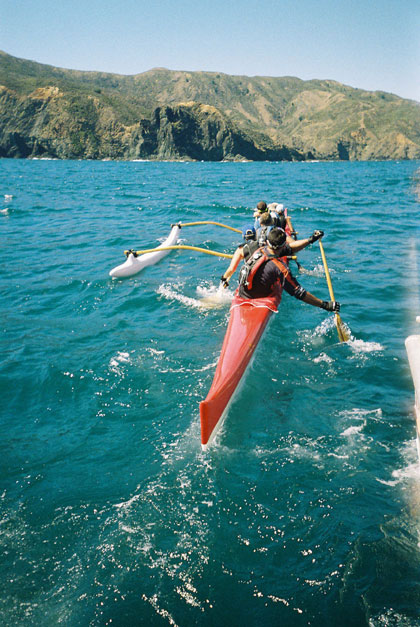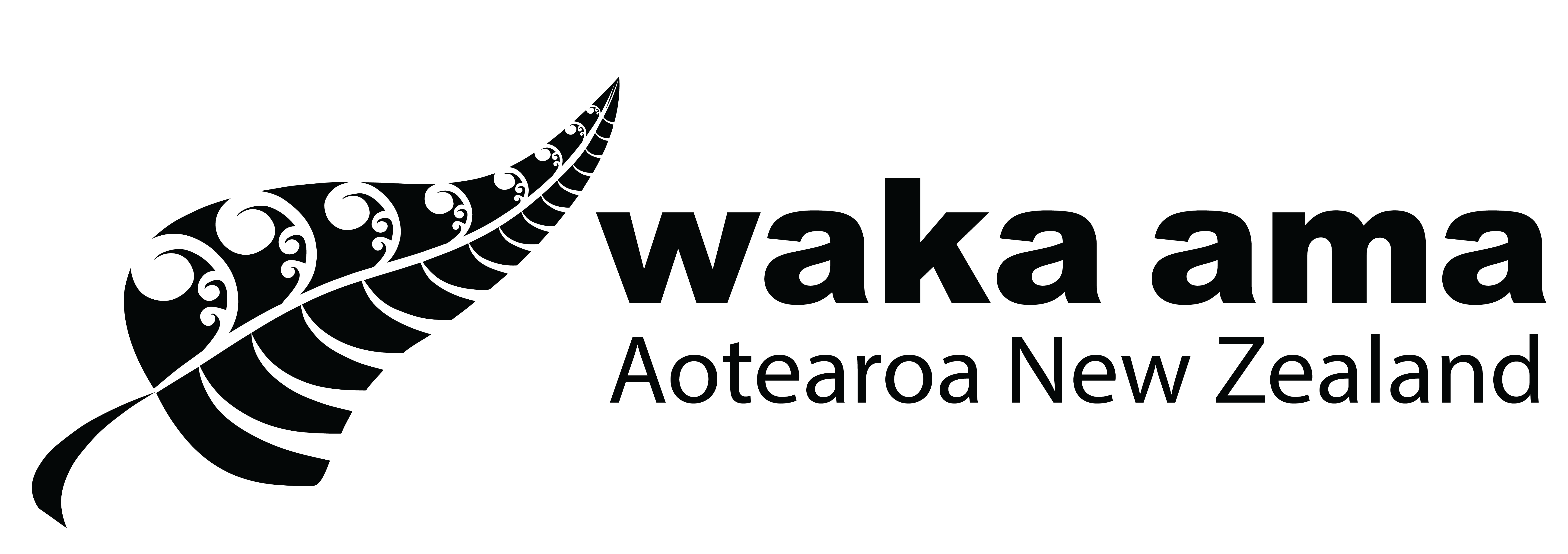Stories
150km Voyage of Discovery
The mission was to paddle a waka ama where no modern day waka ama had been paddled before. To rise to a challenge, embark on a shared voyage of discovery, and have a few laughs along the way.
The mission was to paddle a waka ama where no modern day waka ama had been paddled before. To rise to a challenge, embark on a shared voyage of discovery, and have a few laughs along the way.
Nineteen paddlers chose to accept it – a diverse bunch from Nelson, Motueka, Christchurch and Palmerston North, with a Canadian and American thrown in for good measure.
The route chosen was a circumnavigation of D’Urville Island in the Marlborough Sounds, starting and finishing from Okiwi Bay, just south of the island.
It was a fitting 150km challenge – many years ago Maori waka plied these waters on a regular basis, but as far as we knew, no waka had completed a circumnavigation of the island in more than 150 years.
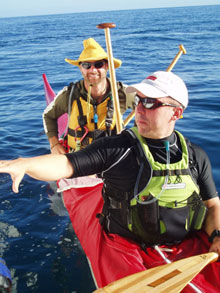 Plus there were natural hazards to contend with – the tumultuous currents of French Pass, which divides the island from the mainland, and the often tempestuous waters at the island’s northern tip, which borders Cook Strait.
Plus there were natural hazards to contend with – the tumultuous currents of French Pass, which divides the island from the mainland, and the often tempestuous waters at the island’s northern tip, which borders Cook Strait.
The instigator of the trip was Peter Low, a former member of Nelson’s Maitahi Outrigger Canoe Club now living a landlubber’s existence in Palmerston North. Peter and several other Maitahi paddlers had been members of crews entered in the Cook Strait race in 2005, which never eventuated due to bad weather. Frustrated at missing out on that test of endurance, they felt there was unfinished business that needed attending to plus. As for the rest – well, they were keen for an adventure.
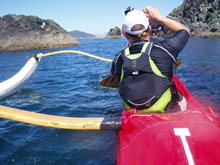 For some, such as novice Nelson paddler Tracey Polglaze who had paddled just a handful of times before, it was a journey into the unknown. For others, such as Shaun and Jane Hardcastle from Christchurch and Rama Gilverson from Canada, who were gearing up for the World Sprint Championships, it would provide a useful barometer of their physical condition.
For some, such as novice Nelson paddler Tracey Polglaze who had paddled just a handful of times before, it was a journey into the unknown. For others, such as Shaun and Jane Hardcastle from Christchurch and Rama Gilverson from Canada, who were gearing up for the World Sprint Championships, it would provide a useful barometer of their physical condition.
To ensure a relatively easy passage around Cape Stephens, where the tidal current can flow up to three knots, we needed to get there by slack tide at 2pm. That meant averaging 12 to 15km an hour. We decided on a rotation schedule which would spell paddlers every 45 minutes, so that no paddler would have to paddle for more than one and a half hours or so at a stretch.
We were fortunate that the weather was calm enough for the waka to pull alongside the support boat so that paddlers could step straight on and off the waka. This meant there was no need for water changes.
We soon settled into an easy rhythm, rolling along a 1m southwesterly swell. Our two waka, Mangopare (hammerhead shark) and Mangoripi (thresher shark), slid steadily past the steep cliffs of D’Urville’s western coast, passing Greville Harbour and then Port Hardy.
Before we knew it, we were at Cape Stephens, looking at the ominiously named Hells Gate - the gap between the island and some rocky islets lying off it. Fortunately for us, there was nothing hellish about this passage today, with the only sign of currents being some slight chop. We were through in no time, and paddling down the eastern coast of the island.
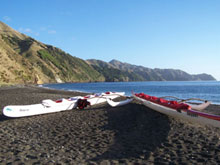 A couple of hours later we reached our destination for the night, Waitai Bay opposite the Rangitoto Islands. Once the waka were parked on the beach, and the tents put up, we kicked back and replenished our energy levels with snacks, dinner and a few quite beers. During the night, the forecast windy weather hit, battering our tents with strong gusts, but by morning it had disappeared again, leaving the sea smooth as glass.
A couple of hours later we reached our destination for the night, Waitai Bay opposite the Rangitoto Islands. Once the waka were parked on the beach, and the tents put up, we kicked back and replenished our energy levels with snacks, dinner and a few quite beers. During the night, the forecast windy weather hit, battering our tents with strong gusts, but by morning it had disappeared again, leaving the sea smooth as glass.
With plenty of time up our sleeve, we started the day’s paddling with a short detour around the Rangitoto Islands, before heading down D’Urville’s eastern coast. For much of the way to French Pass we had a following swell, which made for relatively easy paddling to reach the pass, the notorious stretch of water which has claimed boats and lives with its unpredictable eddies and currents. The passage is just 110m wide and channels water from the vast expanses of Tasman Bay and Cook Strait. At peak tidal flow, the current can reach up to eight knots – far too strong to paddle against. Both waka slipped smoothly through, on the mainland side of the pass, thanks to a slack tide.
From there it was just a couple of hours’ paddle down the south-eastern side of D’Urville Island and back into Croiselles Harbour. Bodies were now starting to feel the effects of the extended paddle – each paddler having paddled a total of about eight hours over the two days – with shoulders, necks and backs seizing up.
Stints resting on the support boat were taken up massaging tired, stiff limbs. But there was no mistaking the feeling of satisfaction as the waka glided into Croiselles Harbour mid-afternoon, 33 hours after launching there. Rafting up near Moukirikiri Island at the harbour entrance, we savoured the experience of achieving our goal and having a good time in the process, and concluded the weekend as we had started with a karakia.
Mission accomplished, we were already planning the next foray into new territory.
